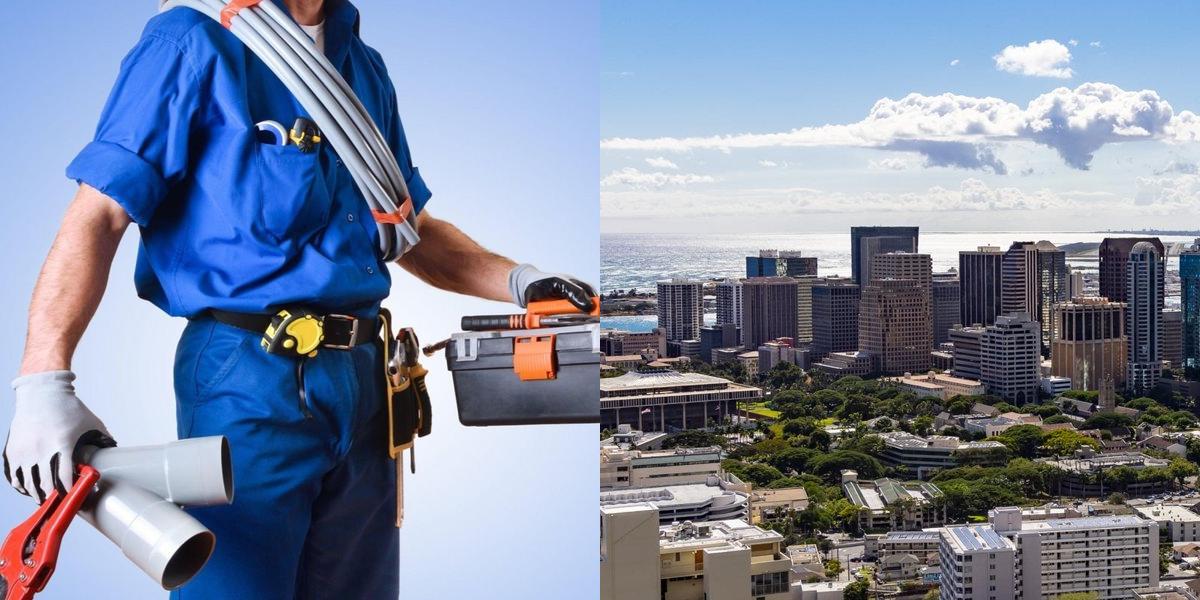How to Become a Plumber in Hawaii

Plumbers play a crucial role in ensuring the smooth functioning of our daily lives. From fixing leaky pipes to installing new plumbing systems, their expertise is essential in maintaining a safe and comfortable environment. If you are considering a career as a plumber in Hawaii, here's what you need to know:
How do I get a job as a Plumber?
After obtaining your plumbing certification, the next step is to find a job as a plumber. Here are some steps you can take to increase your chances of landing a job in the plumbing industry.
Step 1: Create a Professional Resume
Before you start applying for plumbing jobs, it's essential to create a professional resume that highlights your skills, education, and experience. Your resume should include relevant certifications, apprenticeships, and any trade school or college degrees you've earned. Be sure to emphasize any specialized skills or areas of expertise you have, such as working with commercial plumbing systems or installing solar water heaters.
Step 2: Network with Industry Professionals
Networking is a powerful tool when it comes to finding job opportunities in any industry, including plumbing. Connect with industry professionals through trade organizations, plumbing conferences, or online forums. Attend local job fairs or trade shows to meet potential employers and make valuable connections.
Building relationships with established plumbers can also provide you with mentorship opportunities and valuable insights into the industry. They may be able to recommend you for job openings or introduce you to other professionals in the field.
Step 3: Apply for Plumbing Jobs
Once you have your resume ready and have established some professional connections, start applying for plumbing jobs. Look for job postings in newspapers, online job boards, and company websites. Local plumbing contractors, construction companies, and government agencies may also have job openings.
When applying for jobs, tailor your resume and cover letter to each position. Highlight the skills and experiences that make you a strong candidate for the specific role. Follow up with employers after submitting your application to express your interest and inquire about the hiring process.
Step 4: Consider Joining a Union
Joining a plumbing union can offer several benefits, including access to training programs, job placement assistance, and higher wages. Unions negotiate collective bargaining agreements on behalf of their members, ensuring fair wages and working conditions. They also provide ongoing education and training opportunities to help members stay updated on the latest industry trends and technologies.
Research the plumbing unions in your area and consider joining one to enhance your job prospects and further your career in the plumbing industry.
Career Paths and Opportunities after Becoming a Plumber
Becoming a certified plumber opens up a wide range of career paths and opportunities. Here are a few options you can explore after obtaining your plumbing certification:
Residential Plumbing
Many plumbers start their careers in residential plumbing, working on homes, apartments, and condominiums. Residential plumbers install, repair, and maintain plumbing systems in residential properties. This may include fixing leaky faucets, unclogging drains, or installing new plumbing fixtures.
Commercial Plumbing
Commercial plumbers work on larger projects, such as office buildings, shopping centers, and industrial facilities. They install and maintain plumbing systems in commercial properties, ensuring that they meet building codes and regulations. Commercial plumbers may also work on larger-scale projects, such as installing fire suppression systems or designing plumbing layouts for new construction.
Municipal Plumbing
Municipal plumbers work for government agencies and are responsible for maintaining and repairing plumbing systems in public buildings and infrastructure. This may include schools, hospitals, parks, and water treatment plants. Municipal plumbers also play a crucial role in ensuring the safety and quality of public drinking water and wastewater systems.
Pipefitting and Steamfitting
Pipefitting and steamfitting are specialized areas within the plumbing industry. Pipefitters work with high-pressure piping systems, such as those found in industrial plants or power generation facilities. They install and maintain pipes that carry chemicals, gases, or liquids.
Steamfitters, on the other hand, work with pipes that carry high-pressure steam. They install and repair pipes in power plants, heating systems, and other facilities that use steam as a heating source.
Entrepreneurship
After gaining experience and establishing a reputation in the plumbing industry, you may consider starting your own plumbing business. Being an entrepreneur allows you to have control over your work, set your own rates, and choose the projects you want to work on. However, starting a business requires careful planning, financial investment, and a solid customer base.
Final Thoughts
Becoming a certified plumber is a rewarding career choice that offers stability, job security, and numerous opportunities for growth. By following the steps outlined in this article, you can obtain your plumbing certification and start your journey towards a successful career in the plumbing industry. Remember to continue learning and staying updated on the latest industry trends to stay competitive and advance in your career as a plumber.
Are you thinking about a job change or wanting to learn more about different career paths? Feel free to check out these additional articles:

Fel is a student support representative who guides enrollees to the right program and answers their queries. She's committed to helping students and takes pride in her work. In her free time, she enjoys sightseeing and hanging out with loved ones.



